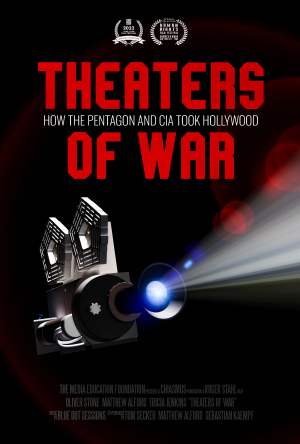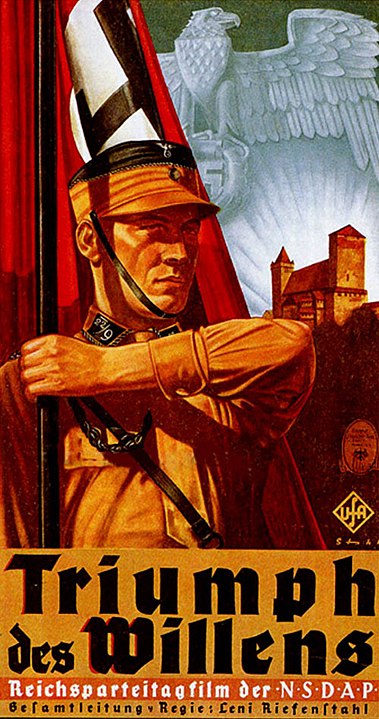
Theaters of War: How the Pentagon and CIA took Hollywood
Brett Gregory, UK Desk for Arts Express on WBAI-FM Radio (New York) interviews Dr. Matthew Alford, Lecturer in Politics, Languages and International Studies at the University of Bath (UK)
BG: Hi, this is the UK Desk for Arts Express, and my name is Brett Gregory. The French Marxist philosopher, Louis Althusser, outlines for us how our values, desires, attitudes and tastes are shaped by wider capitalist-consumer society and culture on a daily basis. He calls this network of influence the ‘Ideological State Apparatus’ and it includes the ‘soft power’ of, for instance, the media, education, religion and the family.
In turn, Althusser also identifies how this societal framework of influence is enforced by the ‘Repressive State Apparatus’. That is to say, the ‘hard power’ of, for example, the military, the police, the judiciary and the prison system.
On this evening's show we're going to be discussing a 2022 independent documentary called ‘Theaters of War: How the Pentagon and the CIA took Hollywood’, an incendiary exposé which reveals how Althusser’s ideas have been combined to produce propagandist entertainment products like Paramount Pictures ‘Top Gun: Maverick’, Amazon Prime's ‘Jack Ryan’ series and Activision's ‘Call of Duty’. But first let's listen to the trailer.
MA: Hi, Brett, my name is Matt Alford. I teach at the University of Bath in the UK and I specialise in the politicisation of media, especially film, and particularly as it relates to British and American foreign policies.
BG: Nice one, Matt. So please tell us, as ordinary citizens and consumers, what are we up against?

MA: The United States Department of Defense has got a budget of $800 billion. It's an obscene amount of money to waste and, you know, there have been all these stories for decades about, you know, the Pentagon spending $640 on a toilet seat and a $1,000 on nacho cheese warmer and things like that. It's a hugely wasteful organisation. It’s not that it's just wasteful and splurging money around but actually that it really quite actively and desperately needs to spend a lot of money on PR, and that's not just to attract personnel but, I think, that it needs to con the whole world and the American public of course, most importantly, into thinking that the American national security state is a force for global stability and it isn't, it just isn't; it hardly ever is. The United States is very commonly a destabilising force in many conflicts.
BG: And what would motivate a powerful governmental entity like the Department of Defense to carry out such a sustained PR assault on us? Haven't they got actual wars to fight and real spies to catch?
MA: I think this need for PR was perhaps most clear in the 1990s after the Soviet Union collapsed, and the whole National Security State started pouring money into PR because at that point there was even less rationale for these heavily state-subsidised taxpayer systems of domination to exist because there was no enemy. It seems a little bit different now because we're in a multipolar world and have been since 2012, maybe 2017, but in the 1990s there was a real opportunity to have developed and forged peaceful alternatives. I mean, there still is but it was extremely clear at that point and I always think it's such a great tragedy and it's, you know, looking at international relations over the past thirty years has just been like watching a slow motion car crash.

BG: And what motivated you personally to pursue this research topic, to co-author your 2017 book ‘National Security Cinema’ with Tom Secker and to co-produce Roger Stahl’s ‘Theaters of War’ documentary?
MA: About twenty years ago I began a lengthy private correspondence with Noam Chomsky, the world's most celebrated anarchist and philosopher, so it was really that experience which drove my research. But that said, there were definitely some politically distinct films around that time, right at the start of my research process.
So, for example, ‘Behind Enemy Lines’ which was set in Bosnia, ‘Munich’ which was about Israel-Palestine and ‘Hotel Rwanda’; and these were all received as moderate, uncontroversial mainstream movies. It was only really when I took a more forensic look at them that I could see that they were actually consistent with much more dubious government policies, and they actually had imperialist ideas quite subtly baked into them.
So, take an example like ‘Three Kings’, this anti-war comedy set in Iraq; it starred Mark Wahlberg, George Clooney, a really good movie. But as good as it was the underlying message of the film was that the United States had been morally inconsistent in the first Gulf War of 1991 and, by implication, this left open the idea that a full-scale American invasion or Allied invasion that advanced all the way to Baghdad would have been better than what they actually did in the real world. And so that meant that when the film's director met George W. Bush in 1999, way before 9/11, and he said to Bush, ‘Look, my film is going to challenge your father's legacy on Iraq’, a young George W. Bush was able to shoot back, ‘Well, I'm going to have to finish the job then aren't I?’

BG: Leni Riefenstahl’s 1935 documentary ‘Triumph of the Will’ is often cited as fetishizing Nazism. Is Hollywood fetishizing US imperialism?
MA: In a hundred years’ time I doubt that cultural historians will be discussing ‘Triumph of the Will’ in the same breath as ‘Transformers 12’. I mean, the Nazis were systematically and deliberately glorifying a particular man, a totalitarian system, so I do think there is a bit of a difference there. To be fair though ‘Top Gun 2’ really does have stronger echoes of genuine fascism, I'd say.
In my country the two most well-known film journalists are Mark Kermode and Simon Mayo. Now they talked about ‘Top Gun 2’ and they loved it and, in fact, they scornfully dismissed any political concerns about it. They said ‘it's a fictional country in a fictional story and it doesn't matter. It's a cartoon, it exists in a cartoony world’ and then they put on these sort of silly voices to mock people like me who read the film politically. I think it's legitimate to enjoy a film on its own merits but I don't think it's good to ignore constantly the systematic application of military PR across thousands of film and TV products and also, I think, particularly in the case of ‘Top Gun 2’, I mean State involvement in that film was so in your face I think that it's kind of weird to ignore or dismiss it.
BG: Surely if the military are at it then so also are, for example, the police. I mean people love their crime dramas.
MA: Absolutely, Brett. Yeah, I completely agree. I think it's reasonable to include the FBI and major police forces like the LAPD and the NYPD in our definition of a security state. If we include the police, the numbers of productions supported by the security state does zip up a little bit and it takes us well past 10,000.
BG: Is it just movies and TV shows? What about video games which are played for hours on end by teenagers in the supposed safety and security of their bedrooms?
MA: Yeah, there are other entertainment products targeted and integrated into the national security state. There is reliable evidence to indicate that the US and UK militaries have supported ‘Doom’, for example. ‘America's Army’ was the most downloaded game for a long time in the early 2000s. ‘Rainbow 6’, ‘Homefront’, ‘Call of Duty’, ‘Medal of Honour’.
There was a game called ‘Mercenaries 2: World in Flames’ which requires the gamer to take part in an invasion of Venezuela because this Hugo Chavez socialist-type leader has used nuclear weapons on the Allies. Now the company that made that had previously developed training aids for the US Army, but claims it didn't cooperate with the Government on that particular product. You know, that kind of idea Venezuela nuking someone – even having nuclear weapons – it's just ridiculous and it's actually a plot device that was used in the Amazon Prime show ‘Jack Ryan’, that hugely popular series - it's insane threat inflation.
BG: But isn't it just entertainment? Aren't we all grown adults free to make up our own minds? Or does history tell us different?
MA: Entertainment can really exert a pivotal impact on society. There's a historian called John H. Franklin and he said that without ‘Birth of a Nation’ from 1915 – the explicitly racist movie – he said that without that film the Ku Klux Klan would not have been reborn. If we talk about the US military in particular, I'd say that if these systems weren't in place, I'd say that within a few years I think the US would probably lose all legitimacy and wouldn't be able to use its force overseas. Which is not far off really what happened for a few years in the immediate aftermath of the Vietnam War.
BG: Surely the US is not the only guilty nation? Surely the UK, for instance, also has its fat fingers stuck in such political pies?
MA: Well, I have looked at other national cinematic systems a little bit and in the UK the Ministry of Defence we now know has worked on hundreds of entertainment productions including films like ‘King’s Men’, ‘KickAss’, various James Bond movies and we are examining the British case now systematically, which is being led by a PhD researcher. What I'd say though is that while it is obviously a good idea to pick apart and generally oppose all propaganda, by any measure – and that's military size, film industry size, foreign policy ambitions, global cultural influence – the United States just dwarfs everybody.
BG: So how can concerned citizens and their families actually watch your documentary ‘Theaters of War’?
MA: Well, contact me on Facebook or on YouTube. I'm on Dr Matt Alford ‘War, Laughs and Lies’. That's if you've got any problems trying to acquire the film, and if you're a student you should be able to find it for free through your library on the system called Kanopy.
BG: Great stuff, Matt. Powerful subject matter. Let's hope people will now think twice about what they pay to entertain themselves.
MA: Thanks very much, Brett. Great talking to you.
BG: This has been the UK desk for Arts Express with Dr. Matthew Alford from the University of Bath, and I've been Brett Gregory. Cheers.
This interview originally appeared on Arts Express via WBAI 99.5 FM radio in New York.

